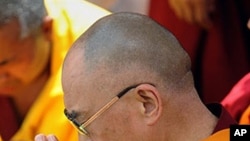Chinese government blames the Dalai Lama's envoys for the lack of results in the latest round of reconciliation talks, which took place at the end of January.
Zhu Weiqun is vice minister of the Chinese Communist Party's United Front Work Department, which that handles Tibet issues.
He made clear Tuesday that China considers the Dalai Lama's call for "greater autonomy" for his homeland to be a disguised call for Tibetan independence.
Zhu says independence for Tibet affects China's territorial integrity and national dignity. He says on these issues, the Chinese government sees no room for negotiation or concession.
The Dalai Lama is Tibet's spiritual leader. He fled to India in 1959, following a failed uprising against Chinese rule in Tibet.
Zhu accuses the Dalai Lama of setting up what he called an illegal government in exile in Dharamsala, India. He also stresses that the Chinese government refuses to discuss whether the Dalai Lama is the representative of all Tibetans, and instead will only discuss terms of his return to Tibet.
Zhu wishes the 74-year-old Dalai Lama a long life, and notes that the Tibetan leader met former Chinese leader Mao Zedong in 1955. He urges the Dalai Lama to think about his own future, though, and adds that China does not want him to be on foreign soil at the end of his life.
The talks that ended Sunday were the ninth round between the Chinese government and envoys from the Dalai Lama since 2002. The last round in November 2008 ended with no results.
Zhu says one difference this time is that the Chinese took the Dalai Lama's envoys to visit Mao's birthplace in Hunan province, and also took them to visit two minority areas to see how the Chinese government implements regional ethnic autonomy.
He says the door to talks remains open unless the Dalai Lama publicly announces Tibet independence. The Tibetan leader has repeatedly renounced independence, and says he wants greater cultural and religious autonomy for his homeland.
Tibetan exiles accuse the Chinese government of discriminating against and repressing Tibetans.
Zhu says Beijing wants to pursue talks so they can be, in his words, "a channel for the Dalai Lama to redress his mistakes."
Lodi Gyari, who represented the Dalai Lama in China, said Tuesday in Dharmasala that the Tibetans remain committed to talking with the Chinese government.
"However, we made it very clear that in order for us to continue this dialogue, there has to be some progress," said Gyari. "For example, it is very clear from our statement, the Chinese government must cease the baseless accusations against His Holiness [the Dalai Lama] - for example, calling him a splittist [separatist]."
Gyari says the Tibetans will seriously consider the information it received from the Chinese. He says the Tibetan officials also are studying the documents from a recent major Chinese government meeting on Tibet.
Also Tuesday, Zhu took strong issue with reports that President Barack Obama will meet soon with the Dalai Lama.
Zhu says if the U.S. leader chooses to meet with the Dalai Lama at this time, it will threaten trust and cooperation between China and the United States.
The Sino-American relationship is already troubled by several other issues, including US arms sales to Taiwan and Washington's concern over China's censorship of the Internet.
China Blames Dalai Lama for Lack of Progress in Talks




